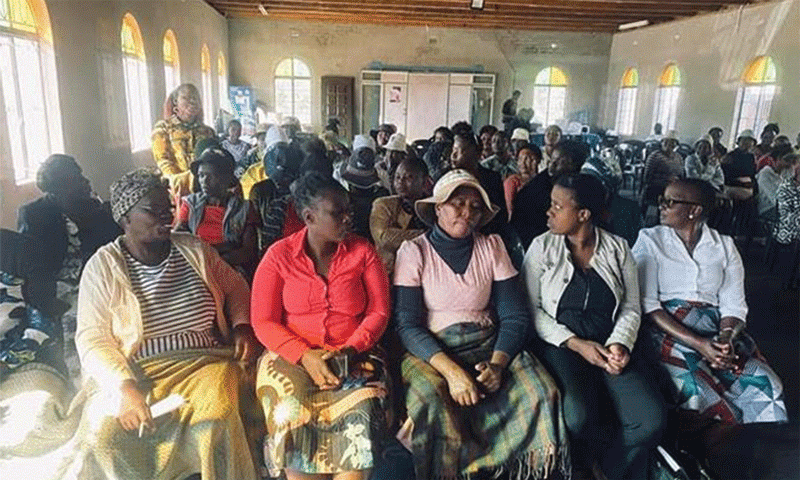
As the world celebrates this year’s International Women’s Month, it must be a time to reflect on the important role that women continue to play in the social and economic transformation of communities across the globe.
This year’s commemorations are being observed under the theme Count her in: Invest in Women Accelerate progress.
This is a very powerful and potent theme that must help set the tone for inclusive conversations around women empowerment and transformation of the girl child. It is also an opportunity for celebration of women’s contributions to history, culture and societies across the globe.
Everyone in our different spheres of influence need to stand in solidarity with women as they strive for a future where all women are empowered, respected, and can reach their full potential. Women dominate the informal economy.
Within informal employment, their wages are lower than that of their male counterparts.
The types of informal work women do as market or street vendors, hawkers or homeworkers, expose them to risks to their physical safety and health.
The provision of social protection, including health insurance, pensions, and maternity benefits, improving occupational safety and reducing work hazards, improving access to child care, and building informal workers’ organisations, alliances and networks are some of the ways that can be undertaken to improve the conditions of informal workers, especially women.
Improving the conditions of informal workers therefore will have to take a gendered approach.
- Perspectives: Social protection for informal workers: Towards sustainable financing and inclusion
- Perspectives: A time to support women in the informal economy
Keep Reading
Addressing the conditions of female informal workers contributes to poverty reduction as it means improving the lives of at least half of the working population in many countries across the globe.
When living and working conditions of female informal workers improve, so does their productivity, which leads to increased income, contributes to overall economic growth, and reduces poverty in the long term.
Gender inequity in the informal economy will have to be taken into account in development planning.
Such action will contribute to aid and governments programmes effectiveness.
The International Labour Organisation (ILO)’s statistical update (June 2022) shows that in over half of the more than 50 countries where the ILO was able to obtain data disaggregated by sex, women outnumbered men as a percentage of informal workers in industries other than agriculture.
According to the international advocacy group WIEGO (Women in Informal Employment, Globalising and Organising), in developing countries, such as Zimbabwe, more women are employed in the informal economy than the formal economy.
It accounts for the lion’s share of employment for women but less so for men. Within the informal economy, men’s share of informal wage employment is higher than women’s share, except in countries with large low-wage export sectors, such as Vietnam, Sri Lanka and the Philippines.
Many women in the informal economy are part of global value chains who work from their homes – homebased workers. And many of the home-based workers are homeworkers.
Furthermore, within the informal economy, women are concentrated in work associated with low and unstable earnings and with high risks of poverty.
Outside of agriculture, women are more likely than men to be own account workers, domestic workers, unpaid contributing workers in family enterprises and industrial outworkers or homeworkers.
A significant proportion of women working in agriculture are also unpaid contributing workers on the family farm or the general agricultural chore. Women spend long hours in unpaid household work.
These responsibilities lead to labour segmentation – women get restricted to own-account or home-based employment, where in most cases, they earn less and lesser than men’s in the same type of informal employment.
In countries where women’s mobility is not restricted, women are market or street vendors or hawkers where they face risks to physical safety and health.
Some organisations such the Vendors Initiative for Social and Economic Transformation (Viset), through their Informal Economy Women’s Hub (INEWOH), they have continued to advocate for policies and initiatives that address the specific challenges faced by women in the informal economy, recognising diversity and inclusion as fundamental principles that should guide gender equality.
At all levels, it is important to ensure that the voices of the marginalized groups within the informal economy, including women with disabilities and youth are represented in decision-making processes.
It is also progressive to acknowledge and recognise the work done thus far by the government of Zimbabwe through the Ministry of Public Service Labour and Social Welfare and the broader informal economy ecosystem to ensure that there is a draft formalisation strategy document for Zimbabwe which is now awaiting Cabinet approval.
As someone who was involved in the initial stages of the development of the formalisation strategy, I remain convinced that an inclusive and democratic formalisation process will go a long way in transforming the prosperities of women informal workers.
The commitment and level of participation shown by women informal workers during the consultative stages of the process brings hope to a sector that has suffered a lot as a result of lack of recognition and support from the government and local authorities.
As Zimbabwe currently stares at one of the worst droughts in recent years, with over 2.7 million people in need of food aid, it is important to guard against early child marriages, and we call upon greater society, and the nation’s justice system to deliver harsh sentences on perpetrators, whilst ensuring that mitigation of climate change and food aid is delivered to every household and village without discrimination.
Unpaid care and domestic work is an albatross around the neck of women and girls, and it is pleasing that the Parliament of Zimbabwe has begun to take this obstacle on, at policy level through consultations.
The lack of access to formal child care due to its cost exacerbates female informal workers’ work burdens.
They are dependent on support from family or from neighbours to take care of their children while doing their work. It is also common for them to bring their children to their work places when informal sources of child care support are not available.
Improvement of women informal workers’ conditions can be brought about through changes in policies, making policies more inclusive of all types of workers – formal and informal.
However, policy change to benefit the women informal workers will only come about with sustained organising.
Policy and policy change happens when pressure, information and campaigning are linked through all levels - informal workers linked to their organisations that in turn link into networks and alliances.
Organising is particularly advantageous to informal workers as they are usually ‘invisible’ in the work place or in value chains, are likely to work in isolation in scattered physical locations such as their own or another person’s home or on the streets and pavements, and are excluded from social and legal protection and from collective bargaining agreements.
- Wadzai is an informal economy expert and Vendors Initiative for social Transformation executive director.
- These weekly articles are coordinated by Lovemore Kadenge, an independent consultant, managing consultant of Zawale Consultants (Private Limited, past president of the Zimbabwe Economics Society and past president of the Chartered Governance & Accountancy Institute in Zimbabwe. . Email - kadenge.zes@gmail.com or Mobile No. +263 772 382 852









